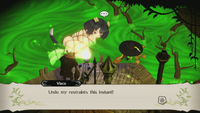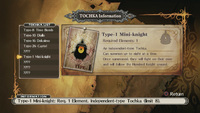|
|

|
PLATFORM
|
PS3
|
BATTLE SYSTEM
|

|
INTERACTION
|

|
ORIGINALITY
|

|
STORY
|

|
MUSIC & SOUND
|

|
VISUALS
|

|
CHALLENGE
|
Easy
|
COMPLETION TIME
|
20-40 Hours
|
|
OVERALL

|
- Metallia is a horrible person.
- Story completely lacking in humor or charm.
- Way too many mechanics.
- Bland, one-button combat.
- Visuals little better than a PS2 game.
+ One of the endings is surprisingly cathartic.
|
Click here for scoring definitions
|
|
|
Disgaea is a game filled with characters that are evil yet endearing, goofy humor, a ton of style, and simple but surprisingly deep mechanics. On the surface, it would appear to have a lot in common with The Witch and the Hundred Knight. After all, this is also a game featuring an evil protagonist, and many of the same people who worked on Disgaea were involved in its creation. That's why it's such a baffling game. All the charm, all the humor, all the substance that makes Nippon Ichi Software's games so well-liked among niche RPGamers is completely absent, and in its place is a muddled, overworked mess of a game starring what has to be one of the most unpleasant, unsympathetic, downright vile main characters in gaming history.
The Witch and the Hundred Knight is about a witch and a single knight who is named Hundred Knight. The witch is named Metallia, and she summons the Hundred Knight from some magical realm to act as her personal servant and henchman. With his help, she hopes to spread the mud of her noxious swamp to the four corners of the world so that she can be recognized as the greatest witch of all time. Although the basic premise immediately rings of Disgaea, the similarities unfortunately end there. Metallia is quite simply an awful human being. She swears at and threatens every single person she meets, often with excruciatingly vile acts. There is no humor in any of it, and certainly none of Nippon Ichi's usual charm. Metallia is simply offensive; she is immediately unlikeable and remains that way until near the end of the game, where the story grasps at some sort of redemption, but fails miserably.
Though her supporting cast isn't nearly as vile, the fact that they willingly associate with such an awful person, despite horrible first encounters and repeated verbal abuse throughout the game, is incomprehensible. The plot itself is a trainwreck that stumbles through a slew of ancillary, mostly pointless side-stories before finally crafting an actual story in the final chapters of the game. Even then, that plot is razor-thin and makes of a number of ridiculous leaps. It doesn't help that the localization is quite poor. The dialogue is stilted, particularly Metallia's childish threats and needless cursing, and all the usual charm that one normally finds in a NIS America title is completely absent. Instead, almost every character is immediately annoying.
 Believe it or not, the giant, tied up dog girl willingly becomes Metallia's friend. Stockholm syndrome?
Believe it or not, the giant, tied up dog girl willingly becomes Metallia's friend. Stockholm syndrome?
|
|
The gameplay, sadly, isn't any better. Players take control of the Hundred Knight as he explores a variety of large, open areas, many of which are far too large and far too open for their own good. Hundred Knight can equip five weapons at a time, which come in five varieties and feature three different types of damage, and swings them one after another in a basic, five-attack combo in order to defeat enemies. He can also dodge and summon Tochkas, magical beings which are sort of like spells, but mostly used for support. Only two of them are really useful for anything other than clearing obstacles, in any case. Most of the time, combat simply comes down to hitting the attack button until everything is dead. Even boss fights typically don't require any more strategy than this.
Of course, the game offers up plenty of ways to strategize. The Witch and the Hundred Knight is a poster child for feature creep. The sheer number of mechanics the game contains is absolutely insane, and many of them are completely pointless, or at the very least easy to ignore. Grade points, bonus points, resistances and immunities, normal enemies and witch familiars, facets, enemy behaviors, stomach stock, and more. It's difficult to keep track of all the different things the game includes, and it would be incredibly time consuming and pointless to go into detail about them all. The only other mechanic that really bears mentioning is the game's GCal system.
GCals are effectively a time limit placed on the Hundred Knight in each area, and a pointless one at that. Performing almost any action in the game - attacking, running, healing, or exploring an unexplored area - costs GCals, which slowly drain down from one hundred each time the Hundred Knight enters an area. Thankfully, GCals are fairly easy to restore. The easiest way is by spending grade points earned in combat, which can restore 10 GCals each. Grade points can be spent at any of the pillars that are scattered throughout each level, and can also be used to grant the Hundred Knight temporary stat boosts. The Hundred Knight can also consume nearly dead foes in order to regain a small amount of GCals, but doing so also fills his inventory up with junk. While the GCals are annoying, they are also the only thing keeping the game even remotely challenging. Combat is brain-dead easy, and when it's not, the reasons for the challenge are obtuse and annoying. Most of the time it's simply because an enemy has immunity to one or two damage types, which just prolongs how long it takes to kill it, or because an enemy has some stupidly strong attack capable of killing the Hundred Knight in a single blow. In these cases, it's almost always better to simply run past the enemies rather than engage them — all the enemies in the game are hilariously slow and won't chase the Hundred Knight for more than a few seconds, so it's not that difficult to do.
 One of two Tochkas that are actually somewhat useful.
One of two Tochkas that are actually somewhat useful.
|
|
Sadly, there really isn't much more to say about the gameplay beyond that. Despite its overcomplicated appearance, the reality of The Witch and the Hundred Knight is that it's a simple, dull button-masher that doesn't really require much thought or effort. The various minor systems offer up a few distractions, and customizing the Hundred Knight's five weapon combo can be sort of fun, but ultimately players will just find themselves in another massive area, running up to enemies and pressing the square button until they die. The problem, unfortunately, is that even though all these systems exist, they are almost all passive in nature and can't really be abused. Even the damage types and immunities and resistances enemies have towards them are rendered pointless since the only way to really abuse it is the completely change the Hundred Knight's equipment loadout each time one is encountered.
The visual design of The Witch and the Hundred Knight is thankfully a bit better than the rest of the game, but still has its share of problems. The art direction is surprisingly good, with a lot of colorful, interestingly decorated levels, but the quality is subpar. The game's models are blocky and ugly, and overall look little better than a PS2 game. Players may also run into problems with the camera, as sometimes the background art obscures sections of the field of view, making it difficult to see the Hundred Knight. The only really good aspect of the game is the catchy soundtrack, which features a number of quality tracks that suit the game's world perfectly. Unfortunately, the voice acting doesn't have the same quality, and is tolerable at the best of times and grating for the rest.
It's hard to imagine just what the developers were thinking when creating The Witch and the Hundred Knight. Metallia is so immediately distasteful that most players will be turned off in the first hour, and players who stick it out longer will likely grow bored and annoyed. The game outstays its welcome by a wide margin and can easily last upwards of thirty hours, though most players will give up on it long before then. I can't think of any audience I would recommend it to, and so I will simply recommend that you spend your money elsewhere. Nippon Ichi can do much, much better than this, and their fans certainly deserve more.
Review Archives
|









